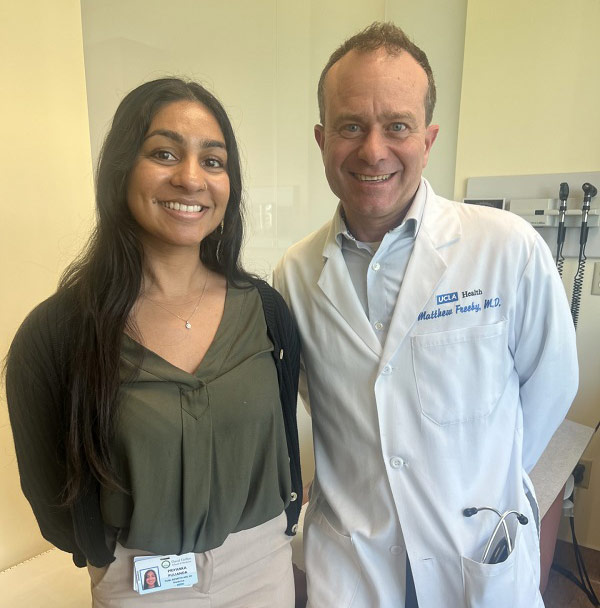Moving the Needle on Vaccinations: Lessons from AACE’s Health System Partners
Spotlight on UCLA

The vaccination QI efforts at the University of California, Los Angeles (UCLA) Gonda (Goldschmied) Diabetes Center have been led by its director, Matthew Freeby, MD. In his nine years at UCLA, Dr. Freeby has been working to improve both access to and the quality of care for patients with diabetes.
Shortly after UCLA was brought on-board as an AACE health system partner in the CDC/CMSS grant, Dr. Freeby posted a notice for project manager position. Dr. Freeby knew that it would be important to have someone on his team who could not only manage the project but understand, from a public health perspective, what was possible and realistic. Priyanka Pulianda, MPH joined Dr. Freeby and has been integral to UCLA’s success in planning and implementing their QI efforts.
Dr. Freeby started by sampling records of some of his own patients and reviewing vaccine coverage data. As a California-based health care provider, UCLA participates in The California Immunization Registry (CAIR). Dr. Freeby found that the although the CAIR system provided very accurate vaccination data, it was difficult to ascertain provider use of vaccination data at the patient level. Expanding the review to other providers, Dr. Freeby recognized that it was difficult to assess the extent to which the endocrine care team was using a patient’s vaccination records to initiate needed discussions about vaccination recommendations.
He identified a need to improve the documentation of vaccine assessment in a patient’s electronic medical record.
Knowing that different providers in the practice had different workstyles, UCLA’s QI intervention involved two options aimed at improving vaccine assessment and its documentation. The first option was the creation of a hard stop in visit notes for the review of influenza and COVID-19 vaccination completions in the history of present illness section. A patient’s record could not be closed without this note. As an alternative, they also adopted a modified template with a dot phrase to add to the note that did not require a hard stop. The dot phrase was meant to assist providers in documentation of their vaccine assessment. The hard stop or dot phrase was implemented based on provider preference.
To date, Dr. Freeby and his team have found that the hard stop is producing better results. Data from multiple PDSA cycles indicate that the hard stop leads to vaccination assessment 100% of the time. The dot phrase option has not produced the same level of performance. Education, outreach, and QI efforts continue. Over time, it is expected that vaccination coverage can be assessed in all patients.
Here are Three Take-away Tips from Dr. Freeby and Ms. Pulianda:
- One size does not fit all!! Goals and plans should be based on your practice and community, not someone else’s. Likewise, if you meet your team where they are, and provide multiple strategies for changing practice to meet an overall goal, you may be more likely to see success.
- Involve your team throughout the process. Getting buy-in for a QI intervention is a start, but regular communication and meaningful feedback on progress towards a shared goal can keep a team engaged. Continued engagement can support short and longer-term improvements.
- Be realistic. Being bold and aspirational is great, but being practical about change will help you meet your goals. Each practice is a part of an institution with a myriad of protocols, some of which are based on the institution’s location. What may be possible in one state may look very different in another part of the country.
If you are interested in leading your own QI intervention to improve vaccination coverage among your adult patients with diabetes, visit AACE’s website and consider using QI tools from the Institute of Healthcare Improvement (IHI). The IHI’s Quality Improvement Essentials Toolkit is a free resource that can help you identify, plan, and measure improvements. Let AACE know if you embark on a vaccination QI effort and on what you learn!
